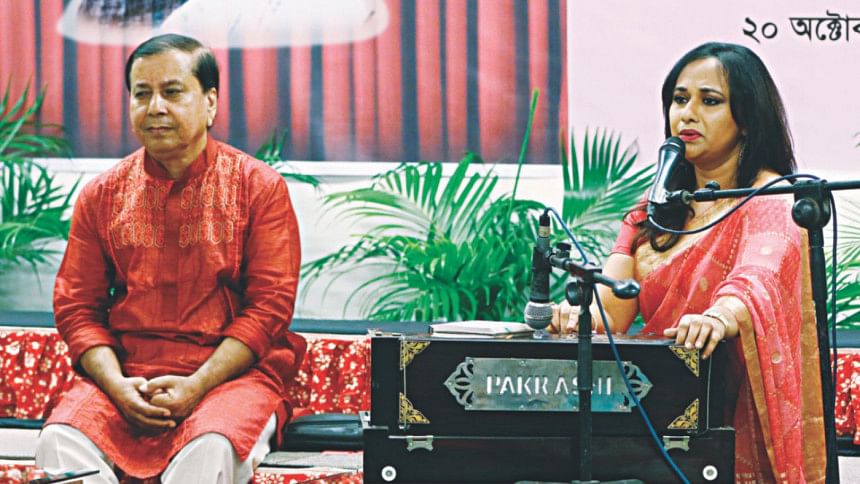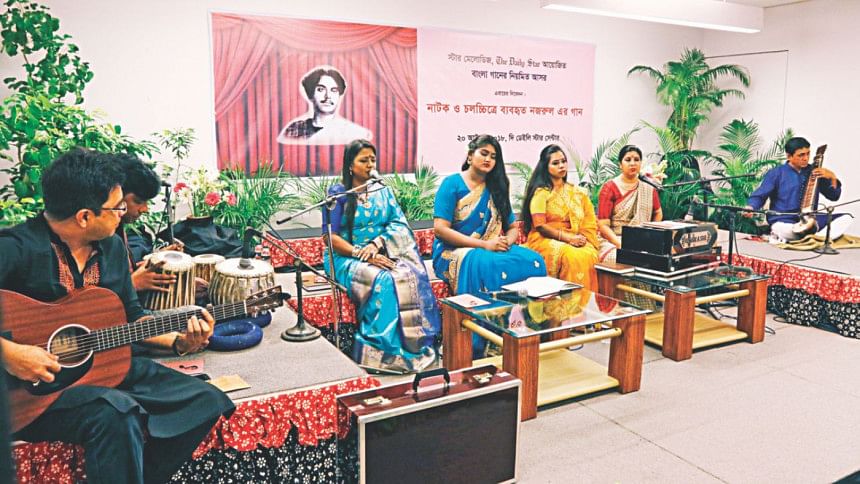'Nazrul Sangeet in Drama and Film'

Star Melodies, an initiative of The Daily Star to promote Bangla music, hosted a musical soiree 'Nazrul Sangeet in Drama and Film' at The Daily Star – Bengal Arts Precinct of The Daily Star Centre, yesterday. It was an initiative to emphasize on those musical pieces of Nazrul, which had an influence in shaping the theatre and film culture of Bengal in its early days. The event was hosted by Sadya Afreen Mallick, Chief, Culture Initiatives, The Daily Star. Artistes Yasmin Mushtari, Sheikh Jasim, Shusmita Anis, Idris Ali, along with some of the students of Nazrul Institute enthralled the audience with tunes like Fagun Raater Fuler Neshai, Akashey Helan Diye Pahar Ghumay Oi, Headmasterer Chori Secondmasterer Dari and many more.
Born in 1899, Kazi Nazrul Islam went on to become the greatest bard of Bengal. But we often associate his name within the confines of the terms -- National Poet, rebel, musician, and tend to leave it at that. However, the maestro's robust artistry far exceeded the aforementioned credentials. He possessed spectacular skills when it came to the art of direction in the fields of film, radio, music and theatre. During those days, the prolific means of entertainment were devices like the gramophone, bioscope and radio. In 1931, Kazi Nazrul Islam was amongst the first Muslim filmmakers to emerge from this province. By then, the 33 year-old was also the chief trainer of The Gramophone Company of India, where leading artistes of the time trained under his tutelage. Besides penning some of the mightiest lyrics in the history of Bangla music, he also opted for perfection as an actor, scriptwriter and also a politician. He was involved in more than 20 films which were adorned with his songs in Bangla, Hindi, Punjabi and Urdu and in turn, enabled Bengali culture to transcend borders. Kazi Nazrul Islam continued his multifaceted work with utmost dedication for many years until his sickness overpowered his prominence. It must be taken into account that in order to uphold the grandeur of this legend to the younger generations, meticulous research about Kazi Nazrul Islam is crucial.

Rezauddin Stalin, a poet and the Deputy Director of the Nazrul Institute; Professor Dr Enamul Haque, winner of Ekushey Padak and the Founder Director General (Rtd) of Bangladesh National Museum, who is the current Chairman of The International Centre for Study of Bengal Art (ICSBA); and Ekram Ahmed, Former Executive Director of Nazrul Institute, were among the distinguished guests attending the musical evening. During the programme, the guests expressed their gratitude towards Star Melodies, The Daily Star, for conducting such diverse cultural events.


 For all latest news, follow The Daily Star's Google News channel.
For all latest news, follow The Daily Star's Google News channel. 



Comments